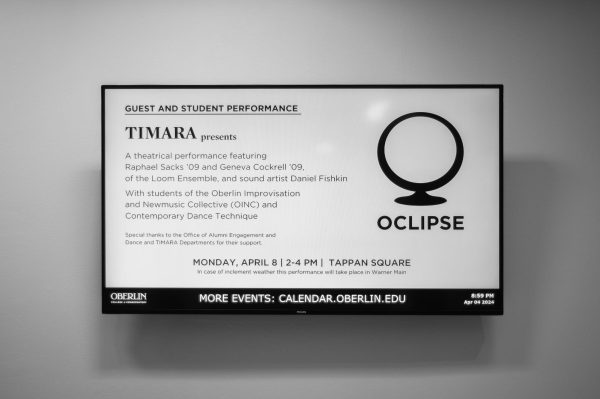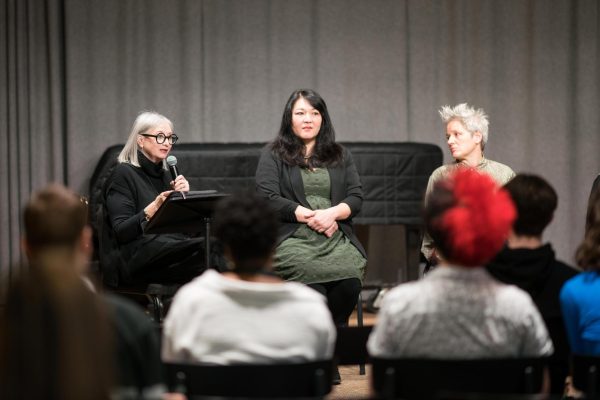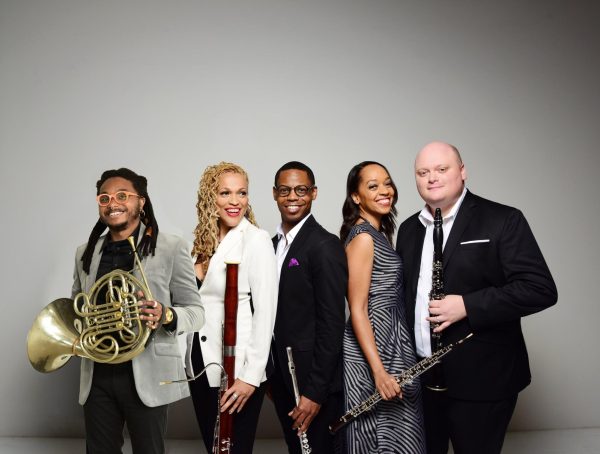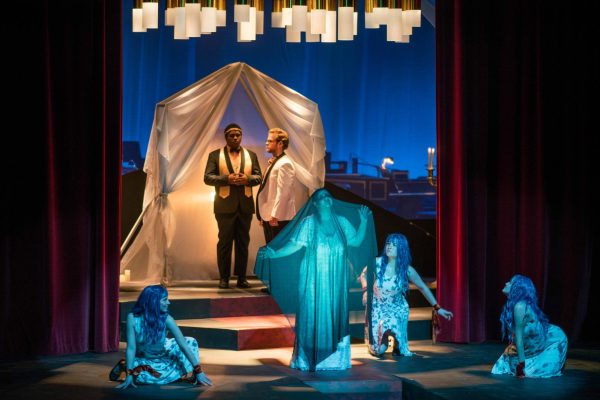Benefit Concert Fundraises for Ukraine Relief
On Wednesday, a host of Oberlin Conservatory faculty, along with guest musicians, performed a benefit concert to raise money for organizations aiding Ukrainian citizens affected by the ongoing war with Russia. The concert featured classical music works from a diverse array of composers and periods, ranging from Johann Sebastian Bach’s Cello Suites to Ernest Bloch’s Prayer.
While the event was free, attendees were encouraged to donate to UNICEF, the Red Cross Ukraine, or Razom, a Ukrainian-American humanitarian organization.
The concert included performances by 16 different individuals and groups from the Oberlin Conservatory faculty and staff, including pianists Scott Cuellar, Peter Takács, Tony Cho, Yulia Fedoseeva, James Howsmon, and Haewon Song; flutist Alexa Still; clarinetist Richard Hawkins; French hornist Jeff Scott; bassoonist Drew Pattison; violinists Francesca dePasquale and David Bowlin; violist Kirsten Docter; cellist Dmitry Kouzov; bassist Derek Zadinsky; and members of the Verona Quartet. Cellist Andrei Ioniță also performed as a guest.
Associate Professor of Cello and co-organizer of the concert, Dmitry Kouzov, explained that he has been glued to news coverage depicting the horrors of the war over the past month, and sees the concert as a way of coping.
“The original idea came from the fact that it’s impossible to watch what’s happening in the news,” he said. “The first ten days, I was glued to my phone, just reading news 24/7, not really sleeping much — putting this program together helped distract myself from the nonstop violence. From the [start] there was overwhelming support from the community and from faculty and from everyone.”
Teacher of Double Bass Derek Zadinsky also performed in the concert, and he echoed some of Kouzov’s feelings of helplessness in the face of this war. He noted that playing in charity concerts is one of the easiest things to do as a musician to help aid humanitarian interventions.
“It’s not often that we get this much of the faculty together to perform on a program,” he said. “Our pain and inconveniences are nothing compared to what people in Ukraine are experiencing right now.”
For Romanian guest performer and cellist Andrei Ioniță — a friend of Kouzov’s — his involvement in the concert is profoundly personal. Romania borders Ukraine to its south, and according to the U.N., has accepted over 550,000 Ukrainian refugees as of March 22
Ioniță, who was in Romania’s capital, Bucharest, less than two weeks ago, saw the condition and outlook of many of the refugees that had fled to Romania firsthand.
“There was a real sense of this ominous feeling growing in the streets there because Romania is right at the border to the Ukraine,” he said. “What really impressed me was the sense of determination that you could see in all of these women’s and mothers’ eyes. They just wanted to protect their children. They are just hoping for a slightly better future than what was happening back in their hometowns.”
Ioniță performed two pieces in the concert, each chosen from his repertoire to help achieve a balance of both mourning and transcendence.
“I will be playing Ernest Bloch,” he said. “This particular piece has a proper fit for the concert. It has the sense of sorrow and longing, but at the same time it is a prayer for peace.”
Ioniță contrasted his more contemporary performance with a rendering of Bach’s Cello Suites, a foundational work of cello.
“To me, [Bach’s] music always brought a sense of serenity and this calmness … just coming from above, not necessarily rooted in earthly problems,” he said.
Kouzov’s identity also plays a role in the way that he experiences the war. He was born in present-day St. Petersburg, and witnessed the collapse of the Soviet Union when he was 16. Having spent considerable time in Ukraine during his youth, he has friends who are still living there.
“It’s very painful to see what’s going on because both places are very close to my heart, and there are people I know [in Ukraine], and also there are lots of people I know, of course, in Russia,” he said. “I could never imagine that the country I was born in would do something like they’re doing now, and it’s very very, very painful to watch. It’s this helpless sense of guilt.”
Ioniță also noted that there are certain aspects of music that make it the perfect vessel for conveying messages such as this one and for allowing people to come together in a way that is important in the face of humanitarian crises.
“Music has in most cases been the language of peace,” he said. “The whole classical music industry is actually so international and so open that it’s really one of the best examples of how people can really come together and understand each other.”
Kouzov encouraged people to continue donating to the three organizations listed on the concert program. You can donate online to UNICEF, Red Cross Ukraine, and Razom.





